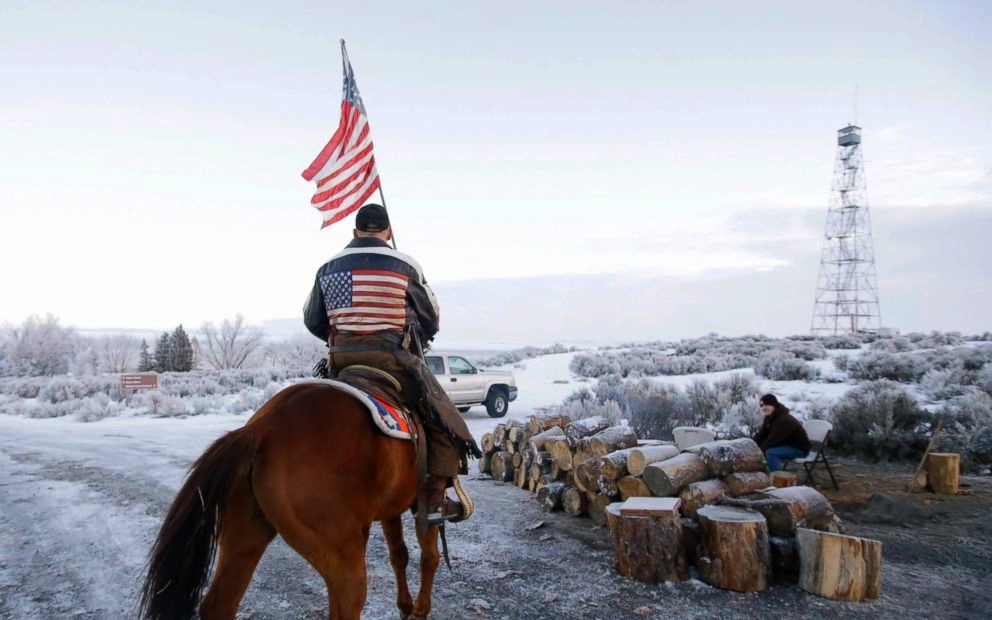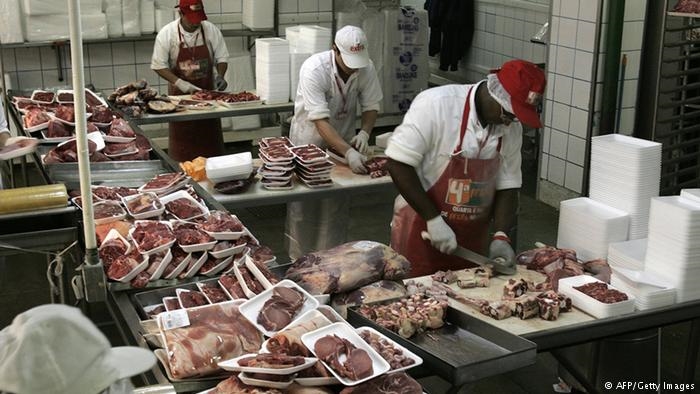Patrick contends that the jury in the first trial concluded that a conspiracy did not exist. He notes that the original indictment lists all of the defendants — both those in the first trial and those in the second — as part of the criminal conspiracy.
Time’s up for prosecutors to decide on another trial
Federal prosecutors face a Monday deadline to decide how — and if — they will proceed with a second trial for occupiers of the Malheur National Wildlife Refuge after the surprising acquittals of the armed standoff’s leaders.
A trial for the seven remaining defendants is scheduled to begin in the middle of February at a federal district court in Portland, Ore.
Prosecutors, however, have given some indication that they are rethinking aspects of their strategy, including what charges they will pursue.
That has led to some speculation about whether they will go forward with the trial at all, and at least one of the defendants filed a motion this week seeking to dismiss the charges against him.
Prosecutors are likely examining how they presented their case in the first trial for standoff leaders Ammon and Ryan Bundy and five other defendants on charges of conspiring to impede federal officials through threats, intimidation or force — the same charge facing the defendants in the trial slated for February.
In particular, observers said, the prosecutors may be closely reading statements from a few jurors after they returned a verdict of not guilty in October that the government didn’t effectively prove the conspiracy charge.
“They might be thinking that it wasn’t just a jury selection issue, it was something deeper than that,” said Tung Yin, a Lewis & Clark Law School professor who has closely followed the trial.
A spokesman for the United States Attorney’s Office for the District of Oregon, Kevin Sonoff, said only that prosecutors would report back to the court by Monday on their plans for the remaining defendants.
Like in the first trial, federal District Court Judge Anna Brown is presiding over the ongoing case. Trial is scheduled to begin Feb. 14, but as of the end of last month, prosecutors were not prepared to tell the court how it planned to proceed. However, they did appear willing to stick to the February start date (Greenwire, Nov. 17).
That led to criticism from Brown, who gave the government until Monday to inform the court of its plans.
The defendants in the upcoming trial are Jason Patrick, Duane Leo Ehmer, Dylan Anderson, Sean Anderson, Sandra Lynn Anderson, Darryl William Thorn and Jake Ryan.
Observers of the case say it is unlikely the government will abandon the upcoming trial, noting how dismayed federal officials including Interior Secretary Sally Jewell were in their statements following the first verdict.
“For federal employees, it’s a concerning verdict,” noted Oregon attorney Matthew Schindler, who represented defendant Kenneth Medenbach in the first trial.
In the second trial, prosecutors “have an opportunity at some degree of vindication,” he said.
Others suggested the government may alter its case. That could include either dropping altogether the conspiracy charge, which is a felony, or adding lesser misdemeanor charges such as criminal trespass.
“If the conspiracy charge is striking jurors as something that is overcharging, then it makes sense to go with some less,” said Vermont Law School professor Pat Parenteau.
Parenteau emphasized that the goal for the prosecution should be to give the jurors enough options to come to a conviction on at least one charge.
But Schindler, who has tried multiple cases before Brown, said attempts to add charges to the indictment would “seriously inflame” the judge.
“Filing new charges against people at this point in time would present a challenge in terms of getting anything done in February,” he said.
Yin, of Lewis & Clark, said the prosecutors would likely be more aggressive in the jury selection process.
In particular, he said, they may press for fewer jurors from eastern Oregon — the more conservative area of the state — than sat on the first jury.
The government is likely looking for “how we can make the jury more neutral,” Yin said.
‘A second, vindictive bite at the apple’
Some of the defendants in the upcoming trial have grown increasingly restless in waiting for the government to lay out its plan.
Patrick, who was probably the most involved at the 41-day standoff of the remaining defendants, filed motions this week to dismiss the charges against him.
In one, he claimed that comments from Oregon U.S. Attorney Billy Williams, FBI officials and Jewell criticizing the October verdict in the first trial have violated his rights to a fair trial and could influence the potential jury.
“Their ‘disappointment’ is nothing less than a thinly veiled accusation that the first jury came, either though conscious desire or unfortunate mistake, to the incorrect conclusion,” Patrick’s attorney wrote. He added that the statements “can only serve to infect any future jury pool with the belief that the first jury erred in its determination that the government had utterly failed to prove its case beyond a reasonable doubt.”
In a more provocative motion, Patrick also sought to have the conspiracy charge dismissed using a legal precedent called collateral estoppel. That principle holds that prosecutors cannot re-litigate facts that were previously decided by a jury’s acquittal in a prior trial.
Patrick contends that the jury in the first trial concluded that a conspiracy did not exist. He notes that the original indictment lists all of the defendants — both those in the first trial and those in the second — as part of the criminal conspiracy.
“A second trial,” Patrick’s lawyer wrote, “would be nothing more than the government seeking a second, vindictive bite at the apple in the hopes that a second jury might come, for whatever reason, to a different conclusion.”
Trump’s role
There are other considerations for the prosecution as well, including the recent election results.
Yin noted that President-elect Donald Trump and his pick for attorney general, Alabama Sen. Jeff Sessions (R), will nominate the next U.S. attorney for Oregon and that he or she will likely have different views on how to proceed with the case than Williams, the current U.S. attorney.
“There will be no continuity at all with the new attorney general,” Yin said. “You’ll have significant discontinuity.”
It’s unlikely Trump’s pick for U.S. attorney for Oregon will be in place in time for the upcoming trial in February unless there are major delays.
But it is also unclear how Trump’s administration will approach prosecutions of protesters of federal public lands management, including the February trial of the Bundys and others in Nevada over the 2014 Bunkerville standoff.
“The new attorney general may say, ‘Forget about this, focus on busting drug defendants,'” Yin said.
Schindler had a different take. He said he expects the Trump administration, with the president-elect’s tough law and order talk on the campaign trail, to be even more aggressive.
“No way” there will be any capitulations, he said.
In the near term, Parenteau said, the goal of the prosecution should be simple, no matter what charges it has to bring.
“The important thing is to get a conviction,” he said. “They have to convict them.”
Jeremy Jacobs

 Free Range Report
Free Range Report

